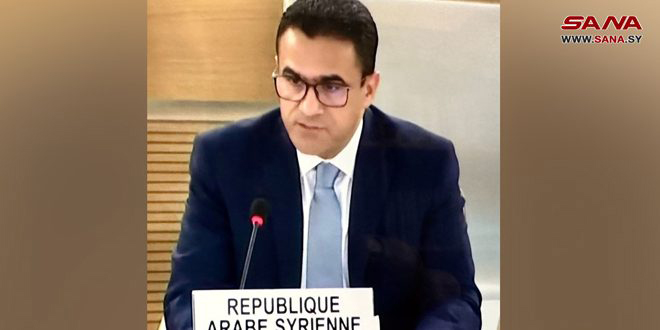Ambassador Ali Ahmd: The coercive measures imposed on the Syrian people impede humanitarian and development work
Ambassador Haider Ali Ahmed, Representative of Syria to the United Nations Office in Geneva, stressed the need for the immediate, complete and unconditional lifting of the unilateral and illegal coercive measures imposed on the Syrian people. He noted that these measures constitute an obstacle to humanitarian and development work and a major challenge towards saving several basic vital sectors.
During the general debate in the humanitarian part of the work of the Economic and Social Council currently convening in Geneva, Ambassador Ali Ahmed said in a statement: “Since the beginning of the terrorist war that was imposed on my country, the government of the Syrian Arab Republic has spared no effort in carrying out its duty, to meet all the humanitarian needs of its citizens, and to improve their living conditions. It has always been keen to cooperate with the United Nations and its organizations working in the humanitarian field in a way that contributes to supporting the efforts of the Syrian state and its institutions, providing assistance to all Syrians without discrimination, achieving early recovery, and rebuilding the infrastructure, services and civilian facilities affected by this war.”
Ambassador Ali Ahmed added: The efforts undertaken by Syria to improve the humanitarian situation of the Syrians have been facing real challenges that have had a significant impact on the lack of tangible progress in the humanitarian situation until today. Therefore, we reaffirm the need for the immediate, complete and unconditional lifting of the illegal unilateral coercive measures imposed on the Syrian people, which constitute an obstacle to humanitarian and development work, and a major challenge towards saving several basic vital sectors.
Ambassador Ali Ahmed underlined the importance of international donors fulfilling their commitments and providing the required funding for the activities and programs of the United Nations, in order to allow the implementation of projects included in the humanitarian response plan, the strategic framework for cooperation between Syria and the United Nations, revitalizing the economy, achieving the 2030 sustainable development goals, and supporting the dignified and voluntary return of the displaced to their homeland.
He pointed out that the funding of the Humanitarian Response Plan for the year 2023 did not exceed 11 percent of the total amount required and the emergency humanitarian needs imposed by the devastating earthquake, as the humanitarian situation worsened and created new difficult conditions that require a long-term response.
Ambassador Ali Ahmed clarified that “while we stress bridging the financing gap, we express our refusal to hold conferences in the absence of the concerned state, and to link the financing of humanitarian aid to political conditions that contradict the principles of humanitarian action”.
He highlighted the need to enhance the delivery of aid from within Syria, in a way that leads to real progress in this field.
The ambassador underscored the need to adopt a comprehensive and realistic approach to the main causes of humanitarian needs that would address the role of foreign occupation and terrorism in the emergence and prolongation of humanitarian crises, and the role of unilateral coercive measures, climate change, drought, water shortage and food insecurity in exacerbating humanitarian and living conditions.
The Ambassador underlined the importance of activating the link between relief and development work, as it is an effective solution to deal with many humanitarian crises, so that the transition from relief to development takes place. This would contribute to reducing dependence on humanitarian aid, and enabling the concerned countries to rely on themselves and their resources, to provide appropriate conditions for the return of the displaced to their homes and regions.
He affirmed the need to support national efforts for the reconstruction of vital civilian facilities damaged by terrorist acts and the earthquake disaster.
Inas Abdulkareem

